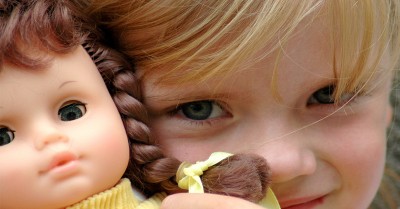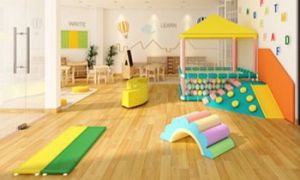Pretend play is very important for children's development and learning. In the house corner, children can take on and try out roles from familiar family scenes, the local community's experiences and imaginative fantasies.
Although this area of the room may be called the house corner, it can be transformed by the children or teacher into a supermarket, restaurant, and post office the choices are endless!
As children act out roles, they develop many skills. They play cooperatively; negotiate turns, exchange ideas and work together to solve problems. Listed below are some suggested learning objectives that support a child's overall development.
- Enables children to draw on past information and experiences to solve problems (the doctor gives me a needle in my arm).
- Helps children identify solutions to problems that arise during play (what are we going to do, I can't feed the baby, there is no food in the house. I have to buy some from the shop).
- Encourages children to preserve at a task (remaining involved in a play episode for an increasing amount of time).
- Assists children in identifying and planning play episodes with others (you be the shopkeeper and I'll buy the food).
- Improves fine motor skills (putting on dress-up clothes and fastening, unbuttoning, zipping etc).
- Allows children to arrange objects according to size (cleaning up props and returning them to labelled places).
- Use symbols to represent real objects and situations (using a block to represent a telephone).
- Addresses fears and worries (trying out new roles and re-playing difficult and scary experiences).
- Children learn to play co-operatively with others (taking turns and sharing materials).
In dramatic play, children draw to open their previous experiences. This enables children with an opportunity to act out any episodes which may have been scary or difficult to deal with.
Linking To The EYLF
- 1.1 – Children feel safe, secure and supported.
- 2.3 ‐ Children become aware of fairness.
- 3.1 ‐ Children become strong in their social and emotional wellbeing.
- 4.1 – Children develop dispositions for learning such as curiosity, cooperation, confidence, creativity, commitment, enthusiasm, persistence, imagination and reflexivity.
- 5.1 – Children interact verbally and non‐verbally with others for a range of purposes.
To download the poster for free: Benefits Of Home Corner



 Open ended questions cannot be responded to with one word answers such as yes or no. These types of questions enables a child to provide
Open ended questions cannot be responded to with one word answers such as yes or no. These types of questions enables a child to provide During your child’s preschool years, an important milestone begins to emerge. This is the development of pre-writing skills. Pre-writing skills are used to encourage, develop
During your child’s preschool years, an important milestone begins to emerge. This is the development of pre-writing skills. Pre-writing skills are used to encourage, develop Open ended materials enables children to play freely. They are objects that have no rules to follow, use or function. Raw materials that can be
Open ended materials enables children to play freely. They are objects that have no rules to follow, use or function. Raw materials that can be An Acknowledgment of the Country is a way of showing respect for the Traditional Owners and can be given by both non-Indigenous people and Aboriginal
An Acknowledgment of the Country is a way of showing respect for the Traditional Owners and can be given by both non-Indigenous people and Aboriginal Language plays an important role in a child’s development. It enables a child to communicate effectively with their family, learn at school, socialize with friends,
Language plays an important role in a child’s development. It enables a child to communicate effectively with their family, learn at school, socialize with friends, Like adults, children have to deal with their own stress in life. Moving house, starting a new school, preparing for a new sibling - these are
Like adults, children have to deal with their own stress in life. Moving house, starting a new school, preparing for a new sibling - these are Playdough is such a versatile material. It provides numerous benefits to children as they manipulate it, it is safe and soothing and provides children with
Playdough is such a versatile material. It provides numerous benefits to children as they manipulate it, it is safe and soothing and provides children with Teaching children about sustainability enables them to appreciate and respect the natural environment. Early childhood services can provide meaningful hand on learning experiences in order
Teaching children about sustainability enables them to appreciate and respect the natural environment. Early childhood services can provide meaningful hand on learning experiences in order Recycling is an important concept that teaches children to care for the environment. It encourages children to be responsible and show a growing appreciating for
Recycling is an important concept that teaches children to care for the environment. It encourages children to be responsible and show a growing appreciating for When children apply paint to paper, glue things together, or pound a lump of clay, they experiment with colour, shape design and texture.
When children apply paint to paper, glue things together, or pound a lump of clay, they experiment with colour, shape design and texture.



